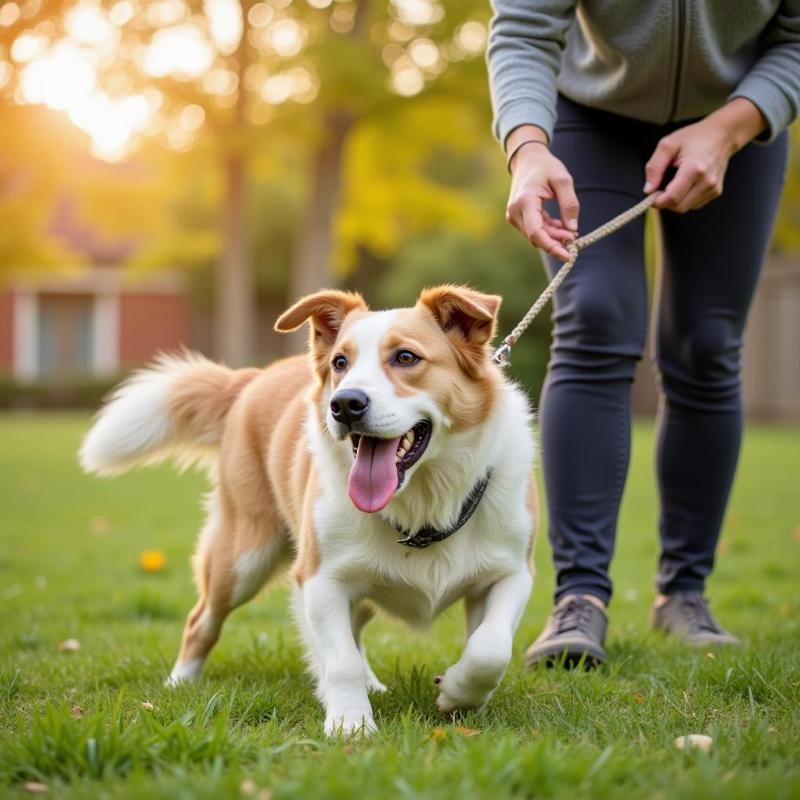In the United States, the question “is a dog considered property?” has a complex answer. Legally, dogs are generally classified as personal property in most states. This classification has significant implications for legal matters such as ownership disputes, liability in dog bite cases, and inheritance. However, this legal definition doesn’t fully capture the emotional bond we share with our canine companions. Let’s delve deeper into the legal standing of dogs as property and explore the nuances of this classification.
Understanding the Legal Definition of Dogs as Property
The classification of dogs as personal property dates back to historical legal traditions. While this might seem cold and impersonal, it provides a framework for resolving legal issues. This classification affects how dogs are treated in cases of:
- Divorce: Just like other assets, dogs may be subject to division in divorce proceedings. Some states are starting to consider the pet’s well-being, but generally, the dog is treated as an asset.
- Theft: If your dog is stolen, it is considered theft of property, not kidnapping. The penalties are often based on the dog’s monetary value, not the emotional distress caused.
- Estate Planning: You can include your dog in your will, dictating who will care for them after your passing, just like any other possession.
This legal framework is essential for providing clarity and resolution in legal disputes. However, it’s important to remember that this doesn’t diminish the emotional value of dogs in our lives.
The Evolving View of Pets in American Society
While the legal definition remains, societal views on pets, especially dogs, are evolving. Many people consider their dogs as family members, not just possessions. This shift in perception has led to:
- “Pet Custody” Laws: Some states are now incorporating the “best interest of the animal” into divorce proceedings, similar to child custody arrangements. This reflects a growing recognition of the emotional bond between humans and animals.
- Increased Legal Protections: Laws against animal cruelty are becoming stricter, reflecting the increasing value placed on animal welfare.
- Pet Trust Laws: These allow pet owners to create trusts specifically for the care of their animals after their passing, ensuring their continued well-being.
This evolving perspective acknowledges the deep emotional connection we have with our dogs and strives to provide legal frameworks that better reflect this reality.
Practical Implications of Dogs as Property
Understanding the legal classification of dogs as property is crucial for responsible pet ownership. This includes:
- Liability: As a dog owner, you are legally responsible for your dog’s actions, including any damage they may cause. This is where the “property” classification comes into play, holding owners accountable.
- Insurance: Pet insurance can help protect you from financial liability in case of accidents, injuries, or property damage caused by your dog.
- Local Ordinances: Familiarize yourself with local ordinances regarding leash laws, licensing, and breed-specific regulations. These laws vary by jurisdiction and are essential for responsible pet ownership.
By understanding the legal and practical implications of dog ownership, you can ensure the safety and well-being of your dog and others.
Balancing the Legal and Emotional Aspects of Dog Ownership
While the law classifies dogs as property, it’s crucial to recognize the profound emotional bond we share with them. This means:
- Providing Proper Care: Meeting your dog’s physical and emotional needs is essential for responsible ownership.
- Advocating for Animal Welfare: Support organizations and initiatives that promote animal rights and responsible pet ownership.
- Treating Your Dog with Respect: While legally property, your dog deserves love, respect, and a nurturing environment.
 Caring for a dog responsibly
Caring for a dog responsibly
Conclusion
The question of whether a dog is considered property in the US is multifaceted. Legally, yes, they are classified as personal property. However, societal views are evolving to recognize the unique bond between humans and dogs. By understanding the legal framework and embracing the emotional connection, we can ensure the best possible care and protection for our canine companions. Remember, responsible pet ownership entails understanding both the legal and emotional aspects of this special relationship.
FAQs
- Can I leave my dog to someone in my will? Yes, you can include your dog in your will, specifying who will care for them after your passing.
- What happens to a dog in a divorce? Dogs are often treated as assets in divorce proceedings, though some states are starting to consider the pet’s well-being.
- Am I liable if my dog bites someone? Yes, as the owner, you are legally responsible for your dog’s actions, including bites.
- Are there laws protecting animals from cruelty? Yes, most jurisdictions have laws in place to protect animals from cruelty and neglect.
- What should I do if my dog is stolen? Report the theft to the police. Dog theft is treated as property theft.
- Do I need to register my dog? Most localities require dog licensing. Check with your local government for specific requirements.
- Can I create a trust for my pet? Yes, some states allow for the creation of pet trusts to provide for their care after your passing.
Beautdogs.us is your premier resource for all things dog-related in the US. We offer expert advice on dog breeds, care, training, and products, catering to both new and experienced dog owners. Our mission is to provide you with the most reliable and comprehensive information to help you navigate the joys and responsibilities of dog ownership. Contact us today for personalized guidance and support! Email: [email protected], Phone: +1 501-555-7529. Visit Beautdogs.us for more information.